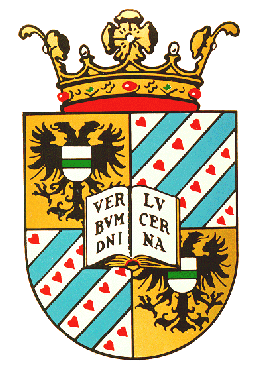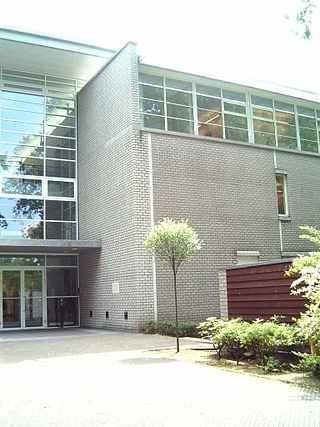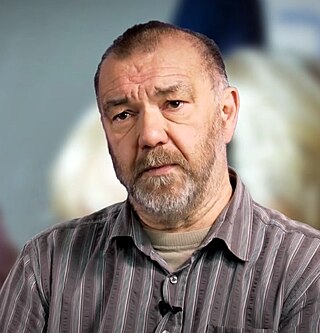
Developmental psychology is the scientific study of how and why humans grow, change, and adapt across the course of their lives. Originally concerned with infants and children, the field has expanded to include adolescence, adult development, aging, and the entire lifespan. Developmental psychologists aim to explain how thinking, feeling, and behaviors change throughout life. This field examines change across three major dimensions, which are physical development, cognitive development, and social emotional development. Within these three dimensions are a broad range of topics including motor skills, executive functions, moral understanding, language acquisition, social change, personality, emotional development, self-concept, and identity formation.
Language acquisition is the process by which humans acquire the capacity to perceive and comprehend language, as well as to produce and use words and sentences to communicate.
Gerard Hendrik (Geert) Hofstede was a Dutch social psychologist, IBM employee, and Professor Emeritus of Organizational Anthropology and International Management at Maastricht University in the Netherlands, well known for his pioneering research on cross-cultural groups and organizations.

The University of Groningen is a public research university of more than 30,000 students in the city of Groningen in the Netherlands. Founded in 1614, the university is the second oldest in the country and one of the most traditional and prestigious universities in the Netherlands.

Dynamical systems theory is an area of mathematics used to describe the behavior of complex dynamical systems, usually by employing differential equations or difference equations. When differential equations are employed, the theory is called continuous dynamical systems. From a physical point of view, continuous dynamical systems is a generalization of classical mechanics, a generalization where the equations of motion are postulated directly and are not constrained to be Euler–Lagrange equations of a least action principle. When difference equations are employed, the theory is called discrete dynamical systems. When the time variable runs over a set that is discrete over some intervals and continuous over other intervals or is any arbitrary time-set such as a Cantor set, one gets dynamic equations on time scales. Some situations may also be modeled by mixed operators, such as differential-difference equations.
Cognitive development is a field of study in neuroscience and psychology focusing on a child's development in terms of information processing, conceptual resources, perceptual skill, language learning, and other aspects of the developed adult brain and cognitive psychology. Qualitative differences between how a child processes their waking experience and how an adult processes their waking experience are acknowledged. Cognitive development is defined as the emergence of the ability to consciously cognize, understand, and articulate their understanding in adult terms. Cognitive development is how a person perceives, thinks, and gains understanding of their world through the relations of genetic and learning factors. There are four stages to cognitive information development. They are, reasoning, intelligence, language, and memory. These stages start when the baby is about 18 months old, they play with toys, listen to their parents speak, they watch tv, anything that catches their attention helps build their cognitive development.

Dan Isaac Slobin is a Professor Emeritus of psychology and linguistics at the University of California, Berkeley. Slobin has made major contributions to the study of children's language acquisition, and his work has demonstrated the importance of cross-linguistic comparison for the study of language acquisition and psycholinguistics in general.
Language attrition is the process of losing a native or first language. This process is generally caused by both isolation from speakers of the first language ("L1") and the acquisition and use of a second language ("L2"), which interferes with the correct production and comprehension of the first. Such interference from a second language is probably experienced to some extent by all bilinguals, but is most evident among speakers for whom a language other than their first has started to play an important, if not dominant, role in everyday life; these speakers are more likely to experience language attrition. It is common among immigrants that travel to countries where languages foreign to them are used.

Child development involves the biological, psychological and emotional changes that occur in human beings between birth and the conclusion of adolescence. Childhood is divided into 3 stages of life which include early childhood, middle childhood, and late childhood (preadolescence). Early childhood typically ranges from infancy to the age of 6 years old. During this period, development is significant, as many of life's milestones happen during this time period such as first words, learning to crawl, and learning to walk. There is speculation that middle childhood/preadolescence or ages 6–12 are the most crucial years of a child's life. Adolescence is the stage of life that typically starts around the major onset of puberty, with markers such as menarche and spermarche, typically occurring at 12–13 years of age. It has been defined as ages 10 to 19 by the World Health Organization. In the course of development, the individual human progresses from dependency to increasing autonomy. It is a continuous process with a predictable sequence, yet has a unique course for every child. It does not progress at the same rate and each stage is affected by the preceding developmental experiences. Because genetic factors and events during prenatal life may strongly influence developmental changes, genetics and prenatal development usually form a part of the study of child development. Related terms include developmental psychology, referring to development throughout the lifespan, and pediatrics, the branch of medicine relating to the care of children.

The Max Planck Institute for Psycholinguistics is a research institute situated on the campus of Radboud University Nijmegen located in Nijmegen, Gelderland, the Netherlands. The institute was founded in 1980 by Pim Levelt, and is particular for being entirely dedicated to psycholinguistics, and is also one of the few institutes of the Max Planck Society to be located outside Germany. The Nijmegen-based institute currently occupies 5th position in the Ranking Web of World Research Centers among all Max Planck institutes. It currently employs about 235 people.
Katherine Nelson was an American developmental psychologist, and professor.
Anat Ninio is a professor emeritus of psychology at the Hebrew University of Jerusalem, Israel. She specializes in the interactive context of language acquisition, the communicative functions of speech, pragmatic development, and syntactic development.
Statistical language acquisition, a branch of developmental psycholinguistics, studies the process by which humans develop the ability to perceive, produce, comprehend, and communicate with natural language in all of its aspects through the use of general learning mechanisms operating on statistical patterns in the linguistic input. Statistical learning acquisition claims that infants' language-learning is based on pattern perception rather than an innate biological grammar. Several statistical elements such as frequency of words, frequent frames, phonotactic patterns and other regularities provide information on language structure and meaning for facilitation of language acquisition.
The following outline is provided as an overview of and topical guide to second-language acquisition:
The Wonder Weeks is the English translation of the Dutch book Oei, ik groei! by physical anthropologist Hetty van de Rijt and ethologist and developmental psychologist Frans Plooij. Originally published in 1992, it has been republished several times, with an updated 6th edition published in 2019. Drawing on many years of observation and analysis of infant development, it gives parents practical guidance to help their baby's cognitive development through its predictable stages or 'leaps'. Its theoretical basis is Perceptual Control Theory, which predicts and explains the observed phenomena. Questioning of the research with mother-infant dyads has received some attention in the press and social media, though sometimes reducing it to a matter of sleep schedules. The research has been replicated several times, and Brazelton found it to be mutually confirmatory with his own work. The book continues to be popular, and the publisher has produced a mobile app based on the book.

Paul van Geert is a Dutch linguist. He is currently a professor of developmental psychology at the University of Groningen, Netherlands. He is renowned for his work on developmental psychology and the application of dynamical systems theory in social science.
Complex Dynamic Systems Theory in the field of linguistics is a perspective and approach to the study of second, third and additional language acquisition. The general term Complex Dynamic Systems Theory was recommended by Kees de Bot to refer to both Complexity theory and Dynamic systems theory.

Marjolijn Verspoor is a Dutch linguist. She is a professor of English language and English as a second language at the University of Groningen, Netherlands. She is known for her work on Complex Dynamic Systems Theory and the application of dynamical systems theory to study second language development. Her interest is also in second language writing.

Cornelis Kees de Bot is a Dutch linguist. He is currently the chair of applied linguistics at the University of Groningen, Netherlands, and at the University of Pannonia. He is known for his work on second language development and the use of dynamical systems theory to study second language development.
Wander Marius Lowie is a Dutch linguist. He is currently a professor of applied linguistics at the Department of Applied Linguistics at the University of Groningen, Netherlands. He is known for his work on Complex Dynamic Systems Theory.









